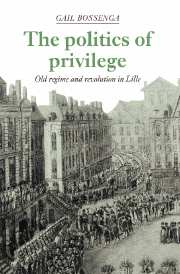Book contents
- Frontmatter
- Contents
- List of figure and tables
- Preface
- List of abbreviations
- 1 Monarchy, privilege and revolution: the problem and setting
- 2 State finance and local privileges
- 3 Corps, bureaucracy and citizenship: the case of the Bureaux des Finances
- 4 The excluded nobility and political representation
- 5 A nation of equals: the demands of the Third Estate
- 6 Uses of a regulated economy: the state against itself
- 7 Corporate privilege and the bourgeoisie
- 8 The abolition of the guilds
- 9 The corporate heritage and the well-ordered state
- 10 Conclusion
- Notes
- Bibliography
- Index
6 - Uses of a regulated economy: the state against itself
Published online by Cambridge University Press: 01 October 2009
- Frontmatter
- Contents
- List of figure and tables
- Preface
- List of abbreviations
- 1 Monarchy, privilege and revolution: the problem and setting
- 2 State finance and local privileges
- 3 Corps, bureaucracy and citizenship: the case of the Bureaux des Finances
- 4 The excluded nobility and political representation
- 5 A nation of equals: the demands of the Third Estate
- 6 Uses of a regulated economy: the state against itself
- 7 Corporate privilege and the bourgeoisie
- 8 The abolition of the guilds
- 9 The corporate heritage and the well-ordered state
- 10 Conclusion
- Notes
- Bibliography
- Index
Summary
For most inhabitants of Lille in the old regime, the idea of an unregulated economy would have seemed preposterous, the occurrence itself highly improbable. The controls were too many, too complex, and too varied. There were import and export duties levied at provincial borders, tolls collected at city gates, subsidized manufactories, obligatory marketplaces, restricted grain sales, municipally regulated industries, and a host of monopolies and quality controls administered by numerous guilds. Any “freedom” in such a system represented a particular right, a product itself of special government dispensation. By the end of 1791, this vast assortment of controls had been dismantled and the economic slate wiped clean, an astonishing accomplishment that has usually been attributed to the rise of the victorious bourgeoisie. Yet in Lille the revolutionary bourgeoisie seemed in no hurry to tear down the guilds, even though it was all too ready for the suppression of vexsome taxes that burdened commerce and industry. In fact, many merchants and manufacturers expressly wanted the guilds' continuation. How is it possible to explain this apparently anomalous position?
The next three chapters look at the relationship of regulation to members of the elite including the municipal magistrates, officials in the royal government, and merchants and manufacturers in the textile industry. Economic regulation, it will be argued, became an unsolvable, contested political issue primarily because of problems generated by the central government itself. The multiplicity of economic controls and the inability of the government to rationalize the economy may be traced back to the fiscalism of the absolutist state, rather than to its organization as a feudal one.
- Type
- Chapter
- Information
- The Politics of PrivilegeOld Regime and Revolution in Lille, pp. 113 - 130Publisher: Cambridge University PressPrint publication year: 1991



